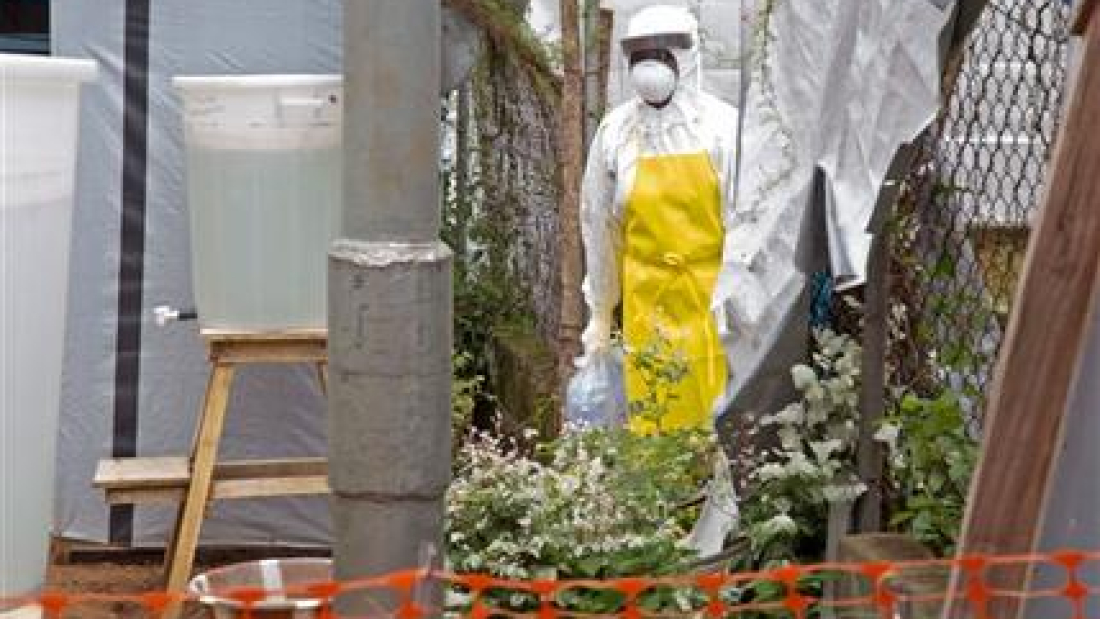This Aug. 12, 2014 file photo shows a healthcare worker walking near an Ebola isolation unit, part of the Ebola outbreak response, wearing protective gear against the virus at Kenema Government Hospital in Kenema, Sierra Leone. Federal researchers next week will start testing humans with an experimental vaccine to prevent the deadly Ebola virus. The National Institutes of Health (NIH) announced Thursday that it is launching the safety trial on a vaccine developed by the agency’s National Institute of Allergy and Infectious Diseases and GlaxoSmithKline. They will test 20 healthy adult volunteers to see if the virus is safe and triggers an adequate response in their immune systems. (AP Photo/ Michael Duff, File)
This Aug. 12, 2014 file photo shows a healthcare worker walking near a Ebola isolation unit wearing protective gear against the virus at Kenema Government Hospital in Kenema, Sierra Leone. Federal researchers next week will start testing humans with an experimental vaccine to prevent the deadly Ebola virus. The National Institutes of Health (NIH) announced Thursday that it is launching the safety trial on a vaccine developed by the agency’s National Institute of Allergy and Infectious Diseases and GlaxoSmithKline. They will test 20 healthy adult volunteers to see if the virus is safe and triggers an adequate response in their immune systems. (AP Photo/ Michael Duff, File)
U.S. federal researchers next week will start testing humans with an experimental vaccine to prevent the deadly Ebola virus.
The National Institutes of Health announced Thursday that it is launching the safety trial on a vaccine developed by the agency’s National Institute of Allergy and Infectious Diseases and GlaxoSmithKline. Beginning Tuesday, it will test 20 healthy adult volunteers to see if the virus is safe and triggers an adequate response in their immune systems.
Even though NIH has been testing other Ebola vaccines in people since 2003, this is a first for this vaccine and its trial has been speeded up because the outbreak in West Africa “is a public health emergency that demands an all-hands-on-deck response,” said Dr. Anthony Fauci, director of the NIAID.
This isn’t a treatment for the disease, but a hoped-for preventative measure. Fauci said the vaccine cannot cause Ebola in the volunteers being tested.
He cautioned that there is no guarantee it will work: “I have been fooled enough in my many years of experience.”
Fauci doesn’t expect results from this initial round of testing until the end of the year, emphasizing that public health measures such as quarantine, isolation, infection control and personal protective devices are still the best way to fight the outbreak that so far has killed at least 1,552 people in West Africa.
The World Health Organization Thursday estimated that the death toll could eventually exceed 20,000, while announcing new efforts to fight what Fauci called the “rapidly evolving and currently uncontrolled outbreak.”
The major target of the vaccine, if it works, would be health care workers, although residents of the area could also be eligible for the shots, Fauci said. More than 240 health workers have become infected in this outbreak, and more than 120 have died, he said. […]
Read Full Story
Date: August 28, 2014
Source: Associated Press – Seth Borenstein
SUBSCRIBE TO OUR BLOG IN THE RIGHT SIDEBAR MENU TO RECEIVE OUR DAILY BLOG POST DIRECTLY TO YOUR E-MAIL
SUBSCRIBE TO OUR NEWSLETTER TO RECEIVE A MONTHLY MAIL WITH MORE RELEVANT INDUSTRY AND COMPANY NEWS


Add a Comment